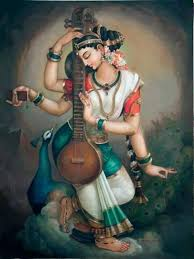The Sarasvati-Rahasya Upanishad (The Mysteries of Sarasvati)
The Sarasvati-Rahasya Upanishad (The Mysteries of Sarasvati)
Once the mind becomes freed from false ideas arising from the attachment to empirical objects, the mind becomes steady like a sheltered lamp and the practitioner experiences the highest bliss in realizing his true self.
The Sarasvati-Rahasya Upanishad, one of 8 Sakta Upanishads attached to the Krishna Yajurveda; unravels the profound mysteries of Goddess Sarasvati, the embodiment of knowledge, wisdom, and creativity. Rooted in the ancient Vedic tradition, this Upanishad explores the spiritual significance of Sarasvati and her role in guiding seekers towards higher learning and enlightenment. Its origins and dating are uncertain but it is believed to have been composed between 800-200 BC. The text has two chapters each in a distinct format. The first is structured in the style of litany hymns and the second is in the Shloka (metered verse) format. The wording of the text has been layered in a way that it can be interpreted in two ways, first of dualistic Bhakti (devotional worship), second of a discourse between the devotee and the goddess representing a steady journey of the devotee towards the Vedanta philosophy, with the text's final verses climaxing with non-dualism premises.
This Upanishad is dedicated to Goddess Sarasvati, who is revered as the personification of knowledge, arts, music, and learning. It delves into the esoteric aspects of Sarasvati’s nature, her symbolism, and the spiritual significance of seeking her blessings to attain higher wisdom and realization. She is revered as the inspiration behind intellectual pursuits and is often depicted holding a veena (musical instrument) and a book, symbolizing the harmony of arts and learning. It emphasizes the importance of seeking knowledge, not only for intellectual growth but also as a means to attain spiritual enlightenment.
The Upanishad celebrates the connection between knowledge and creative expression. It recognizes the role of arts and music as channels to express and experience the divine essence of Sarasvati’s blessings. True knowledge is attained not only through intellectual endeavors but also through sincere devotion to the divine source of wisdom. It guides seekers towards spiritual illumination through the grace of Goddess Sarasvati. By seeking her blessings and surrendering to her wisdom, individuals can attain inner clarity and enlightenment. The teachings of this Upanishad continue to hold enduring significance in Hindu religious and spiritual traditions. It stands as a timeless testament to the divine essence of knowledge and the transformative power of wisdom.



Comments
Post a Comment